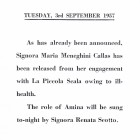Sonnambula 1957Teatro alla Scala, Milan (Piccola Scala)
Read more about the opera Sonnambula
The chorus and orchestra of La Scala Milan appeared with great success at one of the early Edinburgh Festivals in 1950. The two conductors then were the veteran Music Director Victor de Sabata and the brilliant young Guido Cantelli. Clearly it was hoped that the full opera company would visit before long. However the Festival struggled for most of its first half century to accommodate grand opera in the King's Theatre, and no such visit was ever likely. In 1955, a small theatre, the Piccola Scala, was opened in Milan, with the intention of staging new works and revivals of little known smaller pieces. Foreign tours were quickly undertaken, to Vienna and Johannesburg, and an Edinburgh season at last became possible.
The thirty-six year-old Cantelli was appointed to lead the Scala company, but a few days after the announcement, he was killed in an air-crash at Paris on 24 November 1956. It was soon after this that the Edinburgh visit was announced, though the conductors would now be Nino Sanzogno and Antonino Votto. The programme originally announced included the work with which the new Milan house had opened, Cimarosa's Il matrimonio segreto and Bellini's La sonnambula (actually a main house production, though not very grand). Also proposed were Donizetti's Don Pasquale and a double-bill of recent operas by Menotti which would receive British stage premieres - The Medium and Amahl and the Night Visitors.
By August, Gianandrea Gavazzeni had been added to the list of conductors, while the schedule had also changed. Don Pasquale and the Menotti programme were dropped in favour of L'elisir d'amore and Il turco in Italia. While the presence of Maria Callas in the Bellini made headlines, several important singers made British debuts, including Rosanna Carteri and three excellent lyric tenors - Giuseppe di Stefano, Luigi Alva and Nicola Monti.
La Sonnambula was one of the most popular Italian operas in Britain during the 19th century, and was performed frequently by several touring companies. However in recent decades it has fallen from favour, particularly in Scotland, and these are the only performances given in recent years.
Maria Callas only came to the Edinburgh Festival once, as a member of this Scala company. The visit turned into one of those notorious scandals that tended to follow her around when she was the most famous opera singer in the world. It does seem that the problem was not of her making.
The Festival announced five performances of Sonnambula, all with Callas, as agreed with the Scala management. However, Callas's contract was with La Scala, and she had only consented to sing four times. She was tired and unwell, and was contracted to make recordings in Milan immediately afterwards. Of the four performances she did give, the first and third were reckoned to be well below her best form. According to Festival director Robert Ponsonby (writing in the 1969 Festival issue of Opera), the Scala management had simply hoped that she would have a change of heart at the last moment. So when she flew out of Edinburgh on schedule the press had a field day, and she took the blame. Renata Scotto won over a hostile, but ignorant, audience at the final performance. Callas never worked in Scotland again.
The other cast members were excellent, especially Nicola Monti, Nicola Zaccaria and a youthful Fiorenza Cossotto. Luchino Visconti is perhaps remembered now for his films, including The Leopard and Death in Venice, but he was an important director of opera, a famous Traviata at La Scala already accomplished. After this Sonnambula he directed several productions at Covent Garden, most notably Don Carlos though he also did Il trovatore , Der Rosenkavalier and La traviata .
The Piccola Scala company did eventually return to the Festival in 1982, when they brought two rare works. Handel's operas were essentially unknown in Scotland, and this wonderful Ariodante was a great introduction for many of the novices who attended. The early Rossini piece, La pietra del paragone, turned out to be a glorious farce, beautifully performed by a masterly cast.
The Piccola Scala in Edinburgh - 1957
The four productions brought from Milan were: Cimarosa (ll matrimpnio segreto); Rossini (Il turco in Italia); Donizetti (L'elisir d'amore); Bellini (La sonnambula).
The Festival opera schedule was as follows:
First week, commencing 19 Aug: Mon Sonnambula; Tue Matrimonio segreto; Wed Sonnambula; Thu Matrimonio; Fri Elisir d'amore; Sat Matrimonio segreto.
Second week, commencing 26 Aug: Mon Sonnambula; Tue Elisir; Wed Matrimonio segreto; Thu Sonnambula; Fri Turco in Italia; Sat Elisir d'amore.
Third week, commencing 2 Sep: Mon Turco in Italia; Tue Sonnambula; Wed Turco in Italia; Thu Elisir; Fri Turco; Sat Elisir d'amore.
Bellini Operas at the Edinburgh Festival
During his ten year composing career, Vincenzo Bellini produced ten operas. If only five of these have been seen at the Festival, at least the casts have displayed five of the leading sopranos of the age - Maria Callas, Joan Sutherland, Anna Moffo, Renata Scotto and Cecilia Bartoli - as well as some decent tenors (including Luciano Pavarotti , Nicola Monti and Giacomo Aragall).
The ten operas are: Adelson e Salvini (1825); Bianca e Fernando (1826); Il pirata (1827); La straniera (1829); Zaira (1830); I Capuleti e i Montecchi (1830); La sonnambula (1831); Norma (1831); Beatrice di Tenda (1833); I puritani (1835).
Performance Cast
- Lisa proprietor of the inn
- Alessio a villager, in love with Lisa
- Amina an orphan, raised by Teresa
-
Maria Callas (Exc Sep 3)
Renata Scotto (Sep 3)
- Teresa proprietor of the mill
- Notary
- Elvino a prosperous young villager
- Count Rodolfo an aristocrat returning from travel


